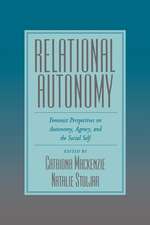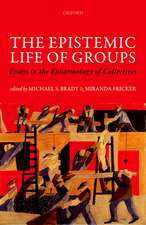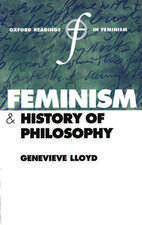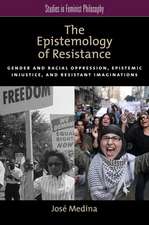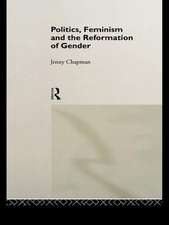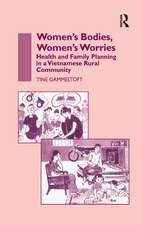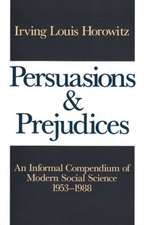Epistemic Injustice: Power and the Ethics of Knowing
Autor Miranda Frickeren Limba Engleză Hardback – 5 iul 2007
| Toate formatele și edițiile | Preț | Express |
|---|---|---|
| Paperback (1) | 215.58 lei 10-16 zile | +29.54 lei 5-11 zile |
| Oxford University Press – 2 iul 2009 | 215.58 lei 10-16 zile | +29.54 lei 5-11 zile |
| Hardback (1) | 610.94 lei 31-37 zile | |
| OUP OXFORD – 5 iul 2007 | 610.94 lei 31-37 zile |
Preț: 610.94 lei
Preț vechi: 823.42 lei
-26% Nou
Puncte Express: 916
Preț estimativ în valută:
116.90€ • 122.38$ • 96.73£
116.90€ • 122.38$ • 96.73£
Carte tipărită la comandă
Livrare economică 26 martie-01 aprilie
Preluare comenzi: 021 569.72.76
Specificații
ISBN-13: 9780198237907
ISBN-10: 0198237901
Pagini: 198
Ilustrații: black & white illustrations
Dimensiuni: 143 x 222 x 17 mm
Greutate: 0.41 kg
Editura: OUP OXFORD
Colecția OUP Oxford
Locul publicării:Oxford, United Kingdom
ISBN-10: 0198237901
Pagini: 198
Ilustrații: black & white illustrations
Dimensiuni: 143 x 222 x 17 mm
Greutate: 0.41 kg
Editura: OUP OXFORD
Colecția OUP Oxford
Locul publicării:Oxford, United Kingdom
Recenzii
an exciting examination of a widespread problem that is rarely discussed in such terms so that it can be understood and communicated, and perhaps, someday, solved
An original and stimulating contribution to contemporary epistemology... There is much to admire in Fricker's book. It is clear, well-written and well-structured. The explanations and arguments are rigorous without being overly technical, and the illustrations are interesting and felicitous. In particular, the book constitutes a striking example of how contemporary epistemology can be enriched by a close attention to our experiences, and of how our understanding of epistemic matters can be deepened through the deployment of ideas from ethics, plitical theory and feminist philosophy. As a result, Epistemic Injustice makes a significant contribution, not just to epistemology, but to all of the disciplines
Compelling and gracefully argued book.
Fricker's Epistemic Injustice constitutes a systematic attempt to explicate epistemic injustice, articulate the harm it inevitably causes, and expound its remedy. In these goals, Fricker is largely successful. In an often gripping manner, Fricker cuts across philosophical subdisciplines in order to expose some of the more sinister aspects of our epistemic practices. For anyone interested in ethics, epostemology, or social and political philosophy, this is surely a must-read.
Miranda Fricker's excellent monograph occupies some relatively uncharted philosophical territory, being 'neither straightforwardly a work of ethics nor straightforwardly a work of epistemology', but instead seeking to '[renegotiate] a stretch of the border between these two regions'...her discussion is outstandingly lucid and persuasive...the book is an admirable reminder of what can be accomplished in under two hundred pages of crisp yet free-flowing philosophical prose. It deserves, and will surely command, widespread attention.
...excellent snd well argued book...This is an important and timely book, argued with care and illustrated with detailed and compelling examples...this is an exemplary discussion of the intersection of knowledge and power.
This is a wonderful book not just for social or feminist epistemologists, but for the discipline as a whole. Fricker succeeds admirably in achieving her main goal of offering a detailed and wide-ranging ethical and epistemological analysis of testimonial injustice...Moreover, the book is beautifully written...
bold and well-argued... [a] rich and elegantly written study... Anyone whose philosophical interest in the concept of knowledge extends beyond merely definitional issues, and addresses its ethical and political dimensions as well as it s genealogy, can ill afford to ignore this book
In this elegantly crafted book, Miranda Fricker's timely project of "looking at the negative space that is epistemic injustice" (viii) comes to fruition...this is a path-breaking study. With this book Miranda Fricker has opened space for the new meanings the "more squarely political" analysis will require. Her readers will look forward to the next phase of this creative, vitally important project.
In this elegant and ground-breaking work, Fricker names the phenomenon of epistemic injustice, and distinguishes two central forms of it, with their two corresponding remedies. As the title conveys, Fricker is working in the newly fertile borderland between theories of value and of knowledge. We are social creatures-something that tends to be forgotten by traditional analytic epistemology. We are also knowers-something that tends to be forgotten by power-obsessed postmodern theorizing. Fricker steers a careful passage between the Scylla of the one and the Charybdis of the other... The book is not only a wonderful, ambitious attempt to bring ethics and epistemology together in a way that has rarely been done before, it is also a beautiful, and powerful, attempt to name something that matters. What progress, to be able to name the enemy, be it sexual harassment or epistemic injustice!
An original and stimulating contribution to contemporary epistemology... There is much to admire in Fricker's book. It is clear, well-written and well-structured. The explanations and arguments are rigorous without being overly technical, and the illustrations are interesting and felicitous. In particular, the book constitutes a striking example of how contemporary epistemology can be enriched by a close attention to our experiences, and of how our understanding of epistemic matters can be deepened through the deployment of ideas from ethics, plitical theory and feminist philosophy. As a result, Epistemic Injustice makes a significant contribution, not just to epistemology, but to all of the disciplines
Compelling and gracefully argued book.
Fricker's Epistemic Injustice constitutes a systematic attempt to explicate epistemic injustice, articulate the harm it inevitably causes, and expound its remedy. In these goals, Fricker is largely successful. In an often gripping manner, Fricker cuts across philosophical subdisciplines in order to expose some of the more sinister aspects of our epistemic practices. For anyone interested in ethics, epostemology, or social and political philosophy, this is surely a must-read.
Miranda Fricker's excellent monograph occupies some relatively uncharted philosophical territory, being 'neither straightforwardly a work of ethics nor straightforwardly a work of epistemology', but instead seeking to '[renegotiate] a stretch of the border between these two regions'...her discussion is outstandingly lucid and persuasive...the book is an admirable reminder of what can be accomplished in under two hundred pages of crisp yet free-flowing philosophical prose. It deserves, and will surely command, widespread attention.
...excellent snd well argued book...This is an important and timely book, argued with care and illustrated with detailed and compelling examples...this is an exemplary discussion of the intersection of knowledge and power.
This is a wonderful book not just for social or feminist epistemologists, but for the discipline as a whole. Fricker succeeds admirably in achieving her main goal of offering a detailed and wide-ranging ethical and epistemological analysis of testimonial injustice...Moreover, the book is beautifully written...
bold and well-argued... [a] rich and elegantly written study... Anyone whose philosophical interest in the concept of knowledge extends beyond merely definitional issues, and addresses its ethical and political dimensions as well as it s genealogy, can ill afford to ignore this book
In this elegantly crafted book, Miranda Fricker's timely project of "looking at the negative space that is epistemic injustice" (viii) comes to fruition...this is a path-breaking study. With this book Miranda Fricker has opened space for the new meanings the "more squarely political" analysis will require. Her readers will look forward to the next phase of this creative, vitally important project.
In this elegant and ground-breaking work, Fricker names the phenomenon of epistemic injustice, and distinguishes two central forms of it, with their two corresponding remedies. As the title conveys, Fricker is working in the newly fertile borderland between theories of value and of knowledge. We are social creatures-something that tends to be forgotten by traditional analytic epistemology. We are also knowers-something that tends to be forgotten by power-obsessed postmodern theorizing. Fricker steers a careful passage between the Scylla of the one and the Charybdis of the other... The book is not only a wonderful, ambitious attempt to bring ethics and epistemology together in a way that has rarely been done before, it is also a beautiful, and powerful, attempt to name something that matters. What progress, to be able to name the enemy, be it sexual harassment or epistemic injustice!
Notă biografică
Miranda Fricker is Reader in the School of Philosophy at Birkbeck College, University of London

